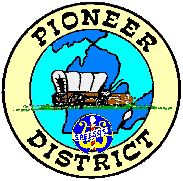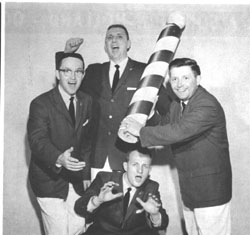


The year 1963 started with a bang when President Bill Hansen announced to the district the establishment of a Long-Range Planning Committee within the Michigan District. The committee was charged with the responsibility of providing proposals which would enhance the district's future. Duane Mosier, long-time barbershopper and historian from the Northwest Detroit Chapter, was appointed chairman of this very important committee.
HEP schools off and runningThe Harmony Education Program was off and running in the Michigan District during the first part of 1963, with two schools scheduled as a continuation of the program begun earlier at Sault Ste. Marie, Ontario. The first school was scheduled for Grand Rapids on February 23, 1963, with Dick Peterson as chairman; and the second was held in Wayne, Michigan, on March 16, 1963. While the exact course schedule varied somewhat from school to school, as did the faculty, the schools were very similar in teaching basic and advanced music and administrative courses. While the attendance at the schools was not quite up to expectations, it was reported the enthusiasm was rampant!
Burt Szabo of the Lansing Chapter (now on the international music staff) was the general chairman for the district convention held in Lansing May 3-5, 1963. The convention featured ten quartets in the international preliminary quartet contest and eight choruses vying for the district chorus crown.
Three quartets qualify in Lansing preliminaries Auto Towners
|
The Michigan District was eligible to qualify three quartets for the big international quartet contest based on membership at the end of February. Winning the right to represent the district at Toronto were the AUTO TOWNERS from Dearborn Chapter, the AIRE-MALES from the Dearborn and Wayne Chapters, and the NOTERIES, also from the Dearborn and Wayne Chapters. In the district chorus competition, the Holland WINDMILL Chorus under the direction of Mike Lucas was declared the new Michigan District chorus champions, with the Windsor SUN PARLOUR Chorus under the direction of Gordon Laing being declared the junior chorus champions.
At the House of Delegates meeting held in conjunction with the contests, the subject of changing the name of the district was again brought to the floor. A motion was made that the Constitution and Bylaws of the Michigan District be amended so as to change the name of this organization, said change to be effective not later than January 1, 1964. A number of names were proposed, but after considerable discussion on the relative merits of the various suggested names, a motion was made and passed that the matter be tabled for consideration at the fall district meeting. At the executive board meeting held prior to the delegate's meeting, a motion was made and passed unanimously that each of the competing quartets be granted $150 and that the chorus be granted $1,050 for travel to the 1963 international convention in Toronto. This was a fair amount of money in those days.
Executive Director Bob Hafer resignsThe resignation of International Executive Director Bob Hafer on November 29, 1962, was accepted with regret by the Executive Board. Bob had become very prominent in the Detroit area after he joined the headquarters staff in Detroit in September of 1949. He served as associate international secretary for four years under Past International Secretary, Carroll P. Adams, who retired due to ill health, in 1953. At the International Board meeting held in Kenosha at Harmony Hall on January 25, 1963, the Board voted to have the Selection Committee present four names of selected applicants to the Board for consideration at the July 1963 meeting at Toronto.
District only qualifies two quartets for International Air Males
|
Even though it was announced at the preliminaries in Lansing that the Michigan District would have three quartet representatives at the international contest, a re-determination of quartet quotas for all districts was held at international headquarters on May 6, 1963. On the basis of per-capita dues remitted to headquarters by the close of business May 5, 1963, it was determined that the district could only qualify two quartets for Toronto. The AIRE-MALES were informed that they could not compete. This discrepancy was caused because many of the district chapters failed to remit their per-capita dues to International as required. Actually, the district had a decline in district membership from 1571 on December 31, 1962 to 1249 on February 28, 1963, a loss of 222 members. At the time and still true today, members dues were collected by each chapter and forwarded to the international headquarters, and the negligence of some chapters to renew their members caused the loss of a competing quartet.
Chord-O-Matics
|
Despite the setback, both Michigan District quartets represented the district well in the international quartet contest. The AUTO TOWNERS moved up one position from the previous year to eighth place, with the NOTERIES finishing in 34th position. In the international chorus competition, the Dearborn Chapter CHORD-ACHORIC Chorus, under the direction of Roger Craig, ended up in tenth place out of the 15 competing.
At the International Board meeting held in conjunction with the Toronto convention on July 4-5, 1963, Barrie Best was selected as the new international executive secretary replacing Bob Hafer. Dan Waselchuk from Green Bay, Wisconsin, was elected to be the new international president for 1964, and Bill Hansen was elected to the International Board representing Michigan for the term beginning January 1, 1964. In another move, it was announced that Hugh Ingraham would move to Harmony Hall to take over the reins of the Public Relations program. He had been the Society's administrative field representative in the Johnny Appleseed District. Hugh filled the position vacated by Curt Hockett who had resigned on May 29, 1963.
Plans for the Michigan District fall convention scheduled for October 11-12, 1963, were laid out early by the Holland Convention Chairman Jack Oonk. Two new contests were added. The "Never Won Nothin' Quartet" contest was added and included in the regular Saturday morning quartet preliminaries. This contest was added to give all the quartets in the district, who ordinarily do not compete, a chance for the honor of being named "champs" in the field they know best, that of audience entertainment. The second contest to be included with the Friday night show was the "Seniors Quartet" contest. This contest was set up for members 50 years of age or older, and was intended to allow the older members of the district a chance to compete against each other in a "fun" contest. To ensure them a "full house" to perform before, the BUFFALO BILLS were booked to headline the show.
 Noteries
|
The planning and the promotion of this convention was high geared, and it was called the "Little International," because besides the BUFFALO BILLS mentioned earlier, they had also booked the SCHMITT BROTHERS (1951 champs) and the then current international champion quartet, the TOWN AND COUNTRY FOUR. Sixteen quartets vied for the Michigan District quartet championship with the NOTERIES from Dearborn and Wayne Chapters taking the crown, followed closely by the FOUR-FITS from the Grosse Pointe Chapter in second, and the WONDERLADS from the Utica-Rochester and Oakland County Chapters finishing third. The AIRE-KNIGHTS from the Windsor Chapter were declared the District junior champs and the SPARTANS from Oakland County, novice champs. In the chorus competition with 12 choruses competing, the Muskegon PORT CITY Chorus under Al Burgess once again reigned supreme and won the honor to represent the district at the international contest in San Antonio the following year. The Holland WINDMILL Chorus finished second.
Port City "64"
|
The Michigan District House of Delegates meeting, held in conjunction with the convention, was lively with the major consideration surrounding the changing of the name of the district. Discussion was limited for the first ballot which resulted in the following proposed names: Michigan 14, Paul Bunyan 11, Great Lakes 10, Michigan-Pioneer 2, Pioneer 2, and Michigan-Windsor-Soo 1. In view of the results and the motion adopted by the House of Delegates eliminating any discussion, the chair immediately called for a second ballot on the top two names which resulted in Michigan receiving 29 and Paul Bunyan 11. Clarence Jalving then gave the report of the Nominating Committee as follows: President Al Burgess; Vice President Zone I Eric Schultz; V.P. Zone II Charles Sherwood; V.P. Zone III Bart Tillitt; V.P. Zone IV Clifford McLean; Treasurer John W. Klaiber; and Secretary Louis R. Harrington. After closing the nominations, the slate was elected unanimously.
The Long-Range Planning Committee which was established earlier and chaired by Duane Mosier, made its first report to the district. The committee consisted of Chase Sanborn, Clarence Jalving, Mark Roberts, Al Burgess, Tom Pollard, Roscoe D. Bennett, William Favinger, Eric Schultz, Louis R. Harrington, James O. Davenport, and Theodore Verway. It can be seen there were many district heavyweights on the committee, and we find it interesting to digress somewhat on this report in the light of today's developments and some of the recommendations of the recent International FUTURE II (1987-1988) Committee reports. The following are the committee recommendations:
1.) It was felt that first and foremost to improve lagging interest and chapter membership decline there is and must be better chapter leadership and programming. To that end the committee recommends that soon after election of chapter officers, but not later than December 15, the District Board should call a meeting of all chapter presidents and secretaries and area counselors, in joint meeting with the District Board, together with an international representative, for a two-day session where the duties of the respective officers and counselors are laid out. Attendance at this meeting was mandatory. After this meeting, the committee recommended quarterly zonal meetings to be called by each of the zone vice presidents to check results and discuss further problems.
2.) The committee recommended that a Standing Committee of experienced barbershoppers be appointed by the district president to assist local chapters in setting up programs of interest by way of help and suggestion after careful study either as to originality or by adoption of successful programs used by other chapters.
3.) It was felt that the office of area counselor had fallen into considerable disrepute in the district, and there was a feeling among many that the office should be abolished, and in its place a part-time field man should be employed to function in place of area counselors. The question of expense ruled out this possible alternative. It was finally considered that all area counselors be required to attend at least two district board meetings during the year to make reports and receive such instructions as the Board may have to offer.
4.) There was a strong feeling that the minimum of 25 members to form and maintain a chapter is too high, and that a letter of protest should be forwarded to the international to reduce the minimum to a more reasonable number. [This was successfully reduced to 12 in 1989.]
5.) If we are to succeed musically, the committee feels it is essential that adequate training must be furnished our quartets and chorus directors in the elements necessary for successful competition. To help in this area, the committee recommends that the District Board set up and promulgate schools of musical education under the direction of one of the many capable international musical leaders. [A forerunner of our present mini-HEPS?].
6.) Because of the lack in the district of certified contest judges, the committee recommended the appointment by the district president of a committee to work with the District Associate Chairman of the Contest and Judging Committee to seek out candidates and assist in training them.
| [index] | [1961] | [1962] | [1963] | [1964] | [1965] | [Contents] |